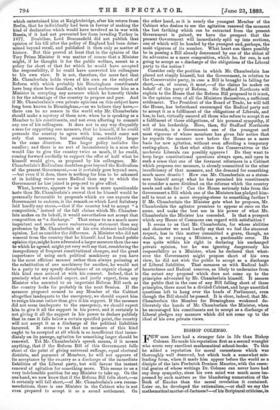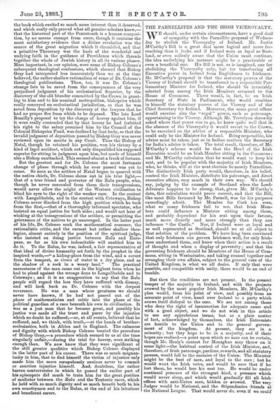BISHOP COLENSO.
FEW men have had a stranger fate in life than Bishop Colmar). He made his reputation first as a second wrangler who wrote very excellent mathematical school-books. To this he added a reputation for moral earnestness which was thoroughly well deserved, but which took a somewhat mis- leading form, when it made him appear before the world as a disciple of the late Frederick Denison Maurice, with the essen- tial genius of whose writings Dr. Colenso can never have had any deep sympathy, since his own mind was much more im- pressed by such matters as the blundering numeration of the Book of Exodus than the moral revelation it contained. Later on, he developed the rationalism,—or shall we say the mathematical matter- of-factness I—of his Scriptural criticism, in
the book which excited so much more interest than it deserved, and which really only proved what all genuine scholars knew,— that the historical part of the Pentateuch is a human composi- tion, by no means exempt from error, though it contains the most satisfactory evidence that a divine revelation was the source of the great migration which it chronicled, and that a primitive Theocracy was the basis of the wonderful and undying faith in the guidance of Providence which threads together the whole of Jewish history in all its various phases. More important, in our opinion, were some of Bishop Colenso's subsequent theological confessions, which showed that Bishop Gray had interpreted less inaccurately than we at the time believed, the rather shallow rationalism of some of Dr. Colenso's theological publications. Then, too, it was Dr. Colenso's strange fate to be saved from the consequences of the very prejudiced judgment of his ecclesiastical Superior, by the discovery of the old blunder committed by the Crown in grant- ing to him and to his nominal metropolitan, bishoprics which really conveyed no ecclesiastical jurisdiction, so that he was saved from deposition by the discovery of the lawyers that be had no proper See from which to be deposed. The late Lord Romilly's proposal to try the charge of heresy against him, if it were really contended that by that heresy he had forfeited his right to the salary promised him by the Council of the Colonial Bishoprics Fund, was declined by that body, so that the invalid judgment of deposition passed by Bishop Gray was never reviewed upon its merits in any Court. Thus the Bishop of Natal, though he retained his position, won his victory by a kind of legal accident, which not only disqualified his supposed superior for sitting in judgment upon him, but made of himself also a Bishop unattached. This seemed almost a freak of fortune.
But the greatest and for Dr. Colenso the most fortunate change of phase through which he ever passed was yet to come. So soon as the settlers of Natal began to quarrel with the native chiefs, Dr. Colenso shone out in his true light,— that of a true friend and protector of the Zulu people, who, though he never concealed from them their transgressions, would never allow the might of the Western civilisation to blind his eyes to the right of the weaker race. In the contest with Langalibalele, and in the eontest with Cetewayo, Bishop Colenso never flinched from the high position which he took from the first,—that of a thoroughly informed spectator, who insisted on equal justice for both sides ; and would not hear of winking at the transgressions of the settlers, or permitting the grievances of the natives to go unavenged. In the latter part of his life, Dr. Coleus() sank the mathematical reasoner, the rationalistic critic, and the earnest but rather shallow theo- logian, almost entirely in the position of the spiritual judge, who insisted on doing justice between Zulu and Euro- pean, so far as his own indomitable will enabled him to do it. To the Zulus, he was, indeed, a fair representative of that ideal of divine humanity set forth by the prophet in the inspired words,—" a hiding-place from the wind, and a covert from the tempest, as rivers of water in a dry place, and as
the shadow of a rock in a weary land." The practical earnestness of the man came out in the highest form when he had to plead against the wrongs done to Langalibalele and to Cetewayo ; and it is no exaggeration to say that the Zulu people will regard the loss they have suffered with dismay, and will look back on Dr. Colenso with the deepest reverence. He was a man whose greatness we should never have known, if he had not passed out of the phase of mathematician and critic into the phase of the political guardian of a race beneath his own in civilisation. It was as a just man that he became great, and possibly his justice was made all the truer and purer by the injustice which no doubt he suffered,—or, at all events, believed that he suffered, and, we think, with truth,—at the hands of brother- ecclesiastics, both in • Africa and in England. The calmness and dignity with which Bishop Colenso treated the procedure of Bishop Gray,—a procedure which seemed to us at the time singularly unfair,—during the trial for heresy, were striking enough then. We now know that they were significant of the still greater qualities which Bishop Colenso displayed in the latter part of his career. There was so much magnan- imity in him, that to find himself the victim of injustice only made him the more scrupulously anxious never to commit or sanction injustice himself. And, doubtless, the rather barren controversies in which he passed the earlier part of his- episcopate did much to train him for the great position of mediator between •the Zulu and the Teutonic races, which he held with so,much.dignity and so much benefit both to his own countrymen and to the Zulus, at the end of his laborious and beneficent career.



































 Previous page
Previous page